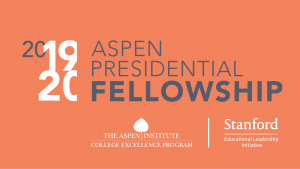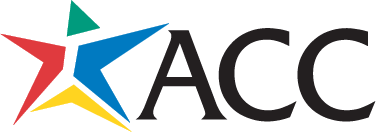I leave on Sunday for Palo Alto to attend the first convening of this year’s Aspen Presidential Fellows. We are a cohort of 40 chosen from around the country, and we’re gathering for a week on the Stanford campus to start learning more about community college leadership and what it takes to be a transformational community college president.

We are the fourth cohort to get the opportunity to connect with community college leaders, be mentored by a current or former community college president, and build our skill set around leading transformational change in our respective (or future) community colleges. The full title of the program is the Aspen Presidential Fellowship for Community College Excellence. Whew! The program is sponsored by the Aspen Institute along with the Stanford Educational Leadership Initiative. It’s a year-long fellowship with three in-person convenings, structured mentoring, lots (and lots) of reading and homework, and a capstone project.
I expect this will be an interesting year of growth, self-reflection, and learning, so I thought I’d share the journey here. Do I want to be a community college president some day? Maybe. Do I want to be the best community college leader I can, no matter my position? Absolutely. This year will be stimulating and challenging and exhilarating and tiring – so say those I know who have been Aspen Fellows before me. But I think it will be consequential for my leadership growth and development.
Part of our first homework assignment (beyond a boatload of reading) was to interview students and ask them three general questions:
- What are your goals and reasons for attending college?
- How and why did you choose ACC?
- How do you define success as a college student? What does being successful during (and after) college mean to you?
We were asked to interview three to five students. I wound up interviewing seven:
- a student who emigrated from Kazakhstan with a bachelor’s in Chemical Engineering who is pursuing an associate degree in programming. He eventually wants to return home to start a programming school for students with disabilities.
- a traditional student who started at ACC straight from high school and has changed his major from business administration to criminal justice because he wants to be a police officer and eventually an FBI agent.
- a mother of five (from 8 years old to college age) who is finally going to college for herself and, while feeling intimidated and unsure, is nonetheless trying to figure out what to study – something in the creative realm like art or design or creative writing.
- a student who has known she wanted to be a nurse since she was three or four years old. She hopes to eventually pursue a DNP (Doctor of Nursing Practice).
- an engineering major who has a bachelor’s in political science but who is making a career change with a plan to go to A&M to study biological and agricultural engineering. She hopes to work in support of effective environmental and energy policy (e.g., renewable energy).
- a nontraditional student who has taken a meandering path but who is focused on getting her associate degree as a sign of accomplishment and transferring to complete a bachelor’s degree in mass communication.
- a Navy veteran who wants to become a doctor and return to the Navy in that capacity.
What a group of students, eh? So how do they define success? Beautifully, of course.
- “To be capable of pursuing your goals persistently. If you don’t stop every time you face a difficulty, you are successful.”
- “I think it’s about you trying, even if you do fail, or not, but you still tried so you’re successful because you went out there and tried something. . . Success is in the effort.”
- “You have goals, you are able to meet each one of them. It takes practice, you learn from the past, you help build a strong foundation.”
- “It means good grades, but also actually understanding, internalizing material . . . Trying to actually learn things.”
- “Managing your time wisely. . . Narrow down what’s important in your life to be successful in college. . . Knowing when to tell your friends that you can’t go out.”
- “To achieve that end goal [of a career] with the least amount of disruption to your well-being as possible.”
- “I think you really need to want to learn. Just be humble enough to . . . learn what your professor has to offer you. Commit to the process. There’s a level of submission [to the professor and his/her knowledge and experience]. . . The idea of submission to achieve my goals is key.”
So, I’m embarking on a journey of submission to the process that will require me to manage my time wisely, learn from the past, internalize what I learn, and pursue my goals persistently.
Wish me luck!
